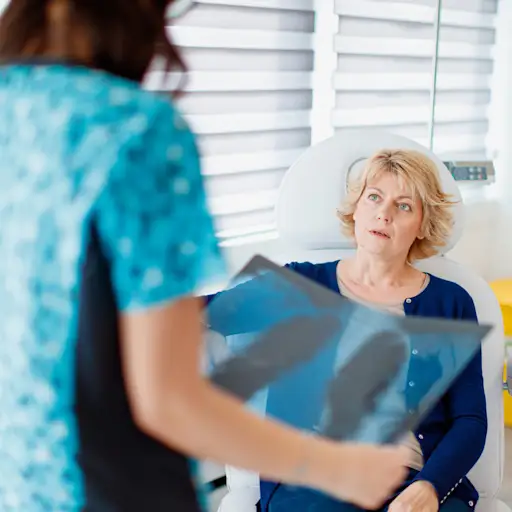8 Ways to Stay Healthy During NSCLC Treatment
无论您是服用药物还是接受手术,这都是以下工作,期间和之后的最佳结果。
So you’re headinginto treatment for your non-small cell lung cancer (NSCLC). Intimidated much? We hear you. But there are ways to make your path a little easier and recovery odds a little stronger—starting with these tips. Every year, there are more than 235,000 newly-diagnosed cases of NSCLC among Americans and, while lung cancer still ranks as the top killer out of all cancers, mortality has dropped due to enhanced drug therapies and increased screening. Keeping up with healthy habits improves the prognosis for any cancer diagnosis—and it’s particularly important if you have NSCLC.
What to Expect
使用NSCLC,强烈的治疗是规范,伴随着严重的副作用,例如化学疗法后食管的炎症。虽然直到第3阶段NSCLC被认为可以治疗,但您仍然会有漫长的旅程。“如果您患有较早的疾病,您可能会接受手术;手术和辐射;或手术,放射,化学疗法和免疫疗法或靶向治疗。但是有一个治疗结束的日期。他说,如果您被诊断出患有第4阶段,“您将长期接受长期治疗。”
Stop Smoking—ASAP
Before you embark on any treatments, experts urge you to quit smoking as fast as possible. “There’s data showing that the operative risk is higher for complications if you’re still smoking on your surgery date,” says oncologist Jack Jacoub, M.D., medical director of MemorialCare Cancer Institute at Orange Coast Medical Center in Fountain Valley, CA. (This may include everything from a higher risk of developing pneumonia to infection at the incision site.) “Keep in mind, too, that some surgeons won’t operate unless you stop smoking which is why they will suggest you try smoking cessation methods immediately.”
Try to Get Some Sleep
We know—it’s not always easy, especially when you’re stressed about your treatment protocol. But getting the recommended seven to nine hours of sleep nightly can make a difference in how your body responds to medication or rebounds from surgery. A good night’s sleep is very restorative, particularly when you’re prepping for procedures, in the middle of treatment, or recovering from either, says Dr. Jacoub. “I urge patients to do all that you can to improve your sleep habits,” he says. “If you need it, medication can also be offered to help you try and get the rest you need.”
Get Moving—However You Can
“The fact is, the more sedentary you are, the less you will tolerate your treatments,” Dr. Jacoub says. “It becomes a vicious cycle.” Other exercise benefits include helping to maintain the amount of oxygen that you can breathe in through your lungs. Be sure to always discuss an exercise plan with your doctor first, Dr. Tchekmedyian says. “You want to do cardiovascular exercise to get your heart rate up and help expand your lung tissue,” he says. “That’s incredibly important before lung cancer surgery.” Some examples of cardio exercise include brisk walking, hiking, jogging, swimming, and biking.
放大蛋白质
为了使您的健康状况在癌症之旅中保持正轨,可以拿到蛋白质,鱼类,牛奶,大豆产品,小扁豆,豆类,坚果和花生酱等蛋白质高的食物,因为蛋白质对于帮助维持肌肉质量至关重要。(恢复过程中久坐的时间过多会导致肌肉无力。)增加蛋白质摄入也很重要,因为化学疗法(癌症本身)可能会导致营养不良以及维生素和蛋白质缺乏症。Jacoub博士说:“如果您需要其他帮助制定进餐计划,请考虑与营养师见面,以帮助您获得所需的营养。”
保持体重稳定
No matter what, this is not the time to lose any weight, Dr. Tchekmedyian says. “It’s common to have a lack of appetite which then leads to weight loss, but it’s important to try to maintain your weight during your treatment process,” he says. “We try to work with patients on shifting their mindset. Especially for those who are used to eating healthfully, it’s important to focus on consuming foods that are high in calories—to avoid any weight loss.”
包括力量训练
Whether you opt for lifting weights or another form of resistance training, focusing on weight-bearing exercise can be very helpful during this time. “Some of the treatments we use can make patients develop brittle bones which can increase long-term fracture risk,” Dr. Tchekmedyian says. “So it’s important to strengthen muscles, but also important to maintain strong bones throughout your treatment.” That's true for many forms of cancer: In绝经后乳腺癌幸存者的一项研究,研究人员比较了两个遵循一年的运动方案的小组,发现那些每周三次进行全身力量训练的人阻止了骨质流失并建立了肌肉。
准备后处理后恢复
完成治疗后,您可能会继续经历挥之不去的副作用。雅各布博士说:“您可能仍然有待处理的残留。”“如果您接受了手术,则可能会疼痛。而且,如果您接受了化学疗法或放射线,那么您可能会遇到极端的疲劳或吞咽困难。”与您的医生谈谈如何在身体愈合后最好地控制您的不适。雅各布博士说:“我最大的建议是:耐心 - 耐心,允许副作用消散,因为它们会随着时间而消失。”
Opt for Complementary Treatments
现在,您已经发现了整个治疗过程中可以保持健康的所有方法,请考虑以下方面:寻找解决诊断可能伴随的压力和焦虑的策略可以帮助您的康复过程。如果可以的话,专家建议您利用互补的健康选择来帮助您应对。Jacoub博士说:“我们已经开始提供灵气和按摩,以帮助患者以心态和心情检查。”“我们敦促我们的患者专注于思维/身体联系,并以希望和积极性面对他们的治疗。这可以帮助我们康复并摆脱生活中的艰难章节。”
美国肺癌统计:American Cancer Society. (2022.) “Key Statistics for Lung Cancer.”https://www.cancer.org/cancer/lung-cancer/about/key-statistics.html
Smoking and Surgery Risks:美国麻醉学会学会。(n.d.)“准备手术:风险和吸烟。”https://www.asahq.org/madeforthismoment/preparing-for-surgery/risks/smoking/
由于久坐行为而引起的肌肉无力:American Cancer Society. (n.d.) “Physical Activity and the Person With Cancer.”https://www.cancer.org/treatment/survivorship-during-during-and-and-weratment/be-healthy-healthy-after--fer-ter-weratment/physical-activity-activity-activity-activity-and-the-cancer-patient.html
Strength Training Benefit in Cancer Treatment:乳腺癌Research and Treatment (2011.) “Strength training stops bone loss and builds muscle in postmenopausal breast cancer survivors: a randomized, controlled trial.”乳腺癌治疗。2011年6月;127(2):447–456
Lambeth Hochwald is a consumer lifestyle reporter covering health, fitness, marriage and family.












